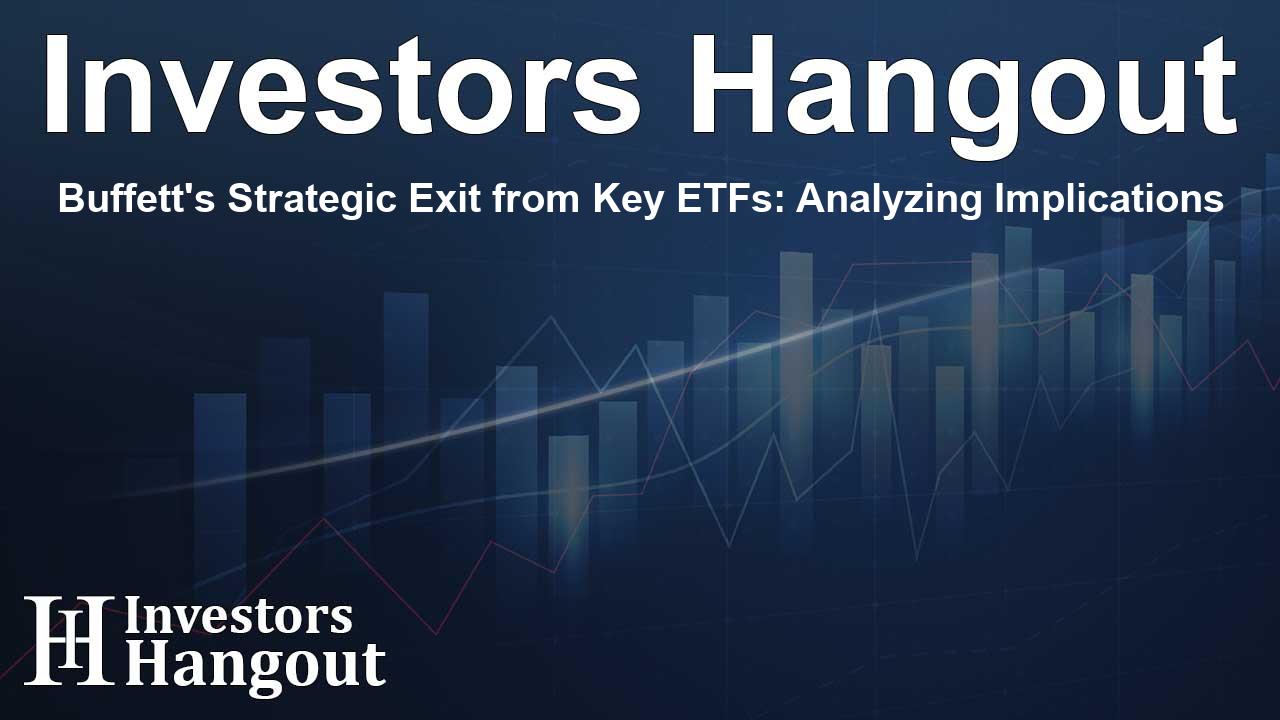Buffett's Strategic Exit from Key ETFs: Analyzing Implications

Buffett's Recent Moves in the ETF Landscape
Recently, Berkshire Hathaway made headlines as it divested from two key S&P 500 ETFs, including the Vanguard S&P 500 ETF, the largest of its kind globally. This bold decision has raised eyebrows in the investment community, leading many to ponder what insights this could offer into the mind of Warren Buffett, often revered as one of the top investors of our time.
When Berkshire Hathaway reports its quarterly 13F filing, it invariably inspires scrutiny and speculation. Investors seek to understand Buffett's thought process, particularly as he often refrains from explaining the rationale behind such decisions. Thus, these actions are open to interpretation.
What makes this latest filing particularly significant is Buffett's complete exit from his position in Ulta Beauty after a mere six months. Additionally, Berkshire completely sold out of two major ETFs that track the S&P 500: the Vanguard S&P 500 ETF and the SPDR S&P 500 Trust ETF. Within the broader context of its vast portfolio, the roughly $23 million allocated to these ETFs may seem minimal against a backdrop of nearly $267 billion, but it hints at deeper sentiments regarding market direction.
Understanding the Market Context
Buffett's decision to exit the S&P 500 ETFs goes against the grain of what many average investors are currently doing. The Vanguard S&P 500 ETF is enjoying unprecedented growth, attracting astounding inflows—around $116 billion last year alone, dwarfing its nearest competitor by $30 billion. The momentum has continued into the current year, with $22 billion in inflows already recorded in January, despite a generally cautious market sentiment.
This contrast between the increasing investment in S&P 500 ETFs by the average investor and Buffett's retreat suggests a noteworthy divergence in expectations for market performance. While many see an ongoing favorable trend, Buffett's actions may convey concern about the sustainability of such a growth trajectory. Recent analysis suggests that large caps could be overvalued following two significant years of returns for the S&P 500, marking a remarkable trend since the late 1990s.
Indeed, the S&P 500's performance over the previous two years was a historic anomaly, displaying back-to-back returns of over 20%. Analysts warn that such high valuations typically precede market corrections, with Buffett potentially anticipating a similar outcome based on historical patterns.
Shifts Towards Active Management
Given these factors and the looming economic challenges, market experts are increasingly emphasizing a 'stock pickers market.' This environment favors actively managed investments, encouraging investors to rely on professional stock selection instead of simple index tracking. The notable shift signifies growing concern over the performance of passive strategies in an unpredictable market landscape.
There’s another important indicator of Buffett's cautious outlook: the staggering amount of cash currently held by Berkshire Hathaway—around $325 billion—surpassing the levels seen just two years ago. This surplus illustrates Buffett's strategy of maintaining liquidity in anticipation of market opportunities while signaling a lack of appealing investments at present.
A crucial takeaway from Buffett's approach is the recognition of valuations; for most investors, particularly those with smaller portfolios, understanding when to pivot towards selective investing is vital in today's climate.
The Road Ahead for Investors
As we digest these developments, it is essential for investors to reassess their strategies. A cautious apportionment to equities and a vigilant eye on market valuation trends will be paramount moving forward. The influence of experts advocating for selective, informed investing will likely gain traction as investors navigate future uncertainties.
Buffett’s recent actions could redefine how both institutional and individual investors view their portfolios, reflecting a willingness to adapt to market realities rather than follow the herd. As the investment landscape continues evolving, learning from the strategies adopted by seasoned investors like Buffett may be more beneficial than ever.
Frequently Asked Questions
What ETFs did Buffett sell recently?
Warren Buffett sold his positions in the Vanguard S&P 500 ETF and the SPDR S&P 500 Trust ETF.
Why is Buffett's recent ETF sale significant?
This move could suggest Buffett's outlook on the market and signal potential caution about the S&P 500's valuation after substantial returns.
What does a stock pickers market mean?
A stock pickers market indicates a climate where actively managed funds may outperform index funds due to market complexities.
How much cash does Berkshire Hathaway hold?
Berkshire Hathaway currently holds approximately $325 billion in cash, signaling a conservative investment stance.
Should individual investors follow Buffett's strategy?
While Buffett’s strategies can provide valuable insights, each investor should align their strategy based on personal risk tolerance and market conditions.
About The Author
Contact Ryan Hughes privately here. Or send an email with ATTN: Ryan Hughes as the subject to contact@investorshangout.com.
About Investors Hangout
Investors Hangout is a leading online stock forum for financial discussion and learning, offering a wide range of free tools and resources. It draws in traders of all levels, who exchange market knowledge, investigate trading tactics, and keep an eye on industry developments in real time. Featuring financial articles, stock message boards, quotes, charts, company profiles, and live news updates. Through cooperative learning and a wealth of informational resources, it helps users from novices creating their first portfolios to experts honing their techniques. Join Investors Hangout today: https://investorshangout.com/
The content of this article is based on factual, publicly available information and does not represent legal, financial, or investment advice. Investors Hangout does not offer financial advice, and the author is not a licensed financial advisor. Consult a qualified advisor before making any financial or investment decisions based on this article. This article should not be considered advice to purchase, sell, or hold any securities or other investments. If any of the material provided here is inaccurate, please contact us for corrections.
